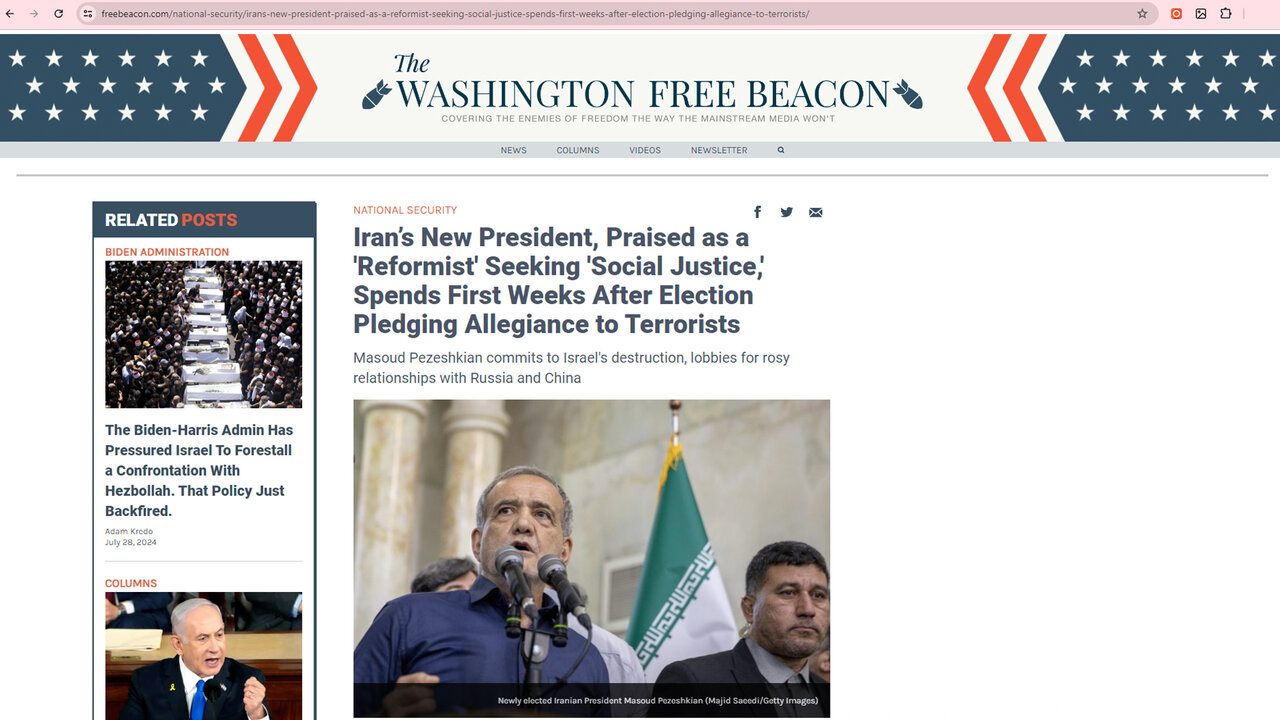Colonial expectations for a country's foreign policy

TEHRAN- On July 19, 2024, the Washington Free Beacon published an article titled “Iran’s New President, Praised as a 'Reformist' Seeking 'Social Justice,' Spends First Weeks After Election Pledging Allegiance to Terrorists,” which is written by Adam Kredo. I will review parts of the article and discuss its accuracy.
The author begins the article by writing: “Iran’s new president, widely touted in Western media outlets as a ‘moderate’ and ‘reformist,’ has spent the weeks following his election pledging to arm regional terror groups and assembling an international ‘Axis of Resistance’ to threaten America”. By reading the text, we find that the author accuses the elected president of Iran of pledging to arm regional terror groups. This accusation is based on the president's actions, including writing a letter to the Secretary-General of Hezbollah in Lebanon, having a conversation with Ismail Haniyeh, and declaring relations with Beijing and Moscow as important for his foreign policy. In fact, Kredo accuses the president of supporting terrorists, while the United States, as Israel's first-class supporter, has supported the genocide in Gaza with all its might. U.S. support for terrorist groups like ISIS will always be remembered by the world.
Kredo continues to write: “Pezeshkian’s quick embrace of the hardline regime’s policies stands in stark contrast to his portrayal across Western media, particularly in America, where publications including the New York Times, CNN, the Washington Post, USA Today, and the Financial Times touted his victory as a sea change for Tehran.” I have to say that I agree with the author on this. Has the West taken a positive step in relation to Iran? Has the geopolitics of the region changed? Has the arrangement of Western forces against Iran in the region changed? So why are the Western media waiting for a surprising change in Iran's positions? Like other countries, Iran follows its fundamental policies to pursue its interests and prioritize its security.
In another part, the author says: “But policy in the Islamic Republic has always been dictated solely by Supreme Leader Ali Khamenei, and Pezeshkian could not have even entered the race without his blessing. Regional observers suspect that, like most recent elections in Iran, the outcome was rigged as part of a plot to elevate a supposed moderate who could ease widespread dissatisfaction with Iranian leadership across the country.” The Constitution of the Islamic Republic of Iran, which was approved by a majority of the Iranian people, outlines the fundamental principles of the country's foreign policy. These principles are consistently upheld by Iranian authorities. While the approach to implementing these principles may vary due to differing political orientations, the core principles remain unchanged.
Ensuring the nation's security and pursuing its progress are not unusual goals; Iranian authorities shape their foreign policy based on the realities of international politics. In response to the suspicion of regional observers, it is important to note that these unfounded claims hold as much weight as unsupported assertions about the earth's flatness. Iranian elections are conducted with representatives of the candidates present at each polling center, ensuring a clear and transparent process. Unfortunately, the organizers of the Iranian elections seem unaware about that the representatives of the Washington Free Beacon should validate the legitimacy of these elections!
Kredo also wrote: “Meanwhile, U.S. intelligence officials disclosed last week that Iran’s regime is running a multi-pronged foreign influence operation that includes paying anti-Israel protesters based in America.” In this section, the familiar story is repeated: while demonstrators opposing Iran and its allies are portrayed as civil activists and freedom seekers, the American anti-genocide demonstrators are accused of receiving funding from Iran.
The author has distorted a part of Dr. pezeshkian's note in the Tehran Times newspaper, claiming that he wrote against the Jewish state. There is no mention of the Jewish state or the Jews anywhere in the text of elected president and he wrote against Zionist regime. In fact, despite the interest of Western governments and media to label anti-Zionist demonstrations as anti-Jewish movements, Iranians have always considered Zionism and Judaism to be two separate issues.
In the following, the author discusses Iran's relations with China and Russia, as noted by Dr. Pezeshkian in the Tehran Times. These relations are characterized “as part of the trio’s Axis of Resistance against America”. Additionally, the text concludes by highlighting the positive relations between Iran and Qatar, which are also framed within the context of Iran's support for Hamas!
In fact, as the authors of such texts expect, Iran should shut down its foreign ministry and choose the proposed options from the West for its relations. It should be reminded that after centuries of colonization and two world wars, even in the United Nations Charter proposed by the West, the sovereignty of countries is recognized. Countries can choose which nations to engage with based on their interests and what path to take to achieve their goals. When Western countries make decisions based on their national interests, they cannot expect Iranian leaders to change their approach towards the West without seeing a positive step from the West. In fact, if the author is eager to understand the reason for Iran's skepticism towards the West, it would be good to look at the U.S. Congress, where Netanyahu, as a war criminal pursued by the International Criminal Court and a destabilizer of the region, is encouraged by members of Congress.
Leave a Comment